English_Debate英文辩论赛技巧
- 格式:doc
- 大小:107.00 KB
- 文档页数:19
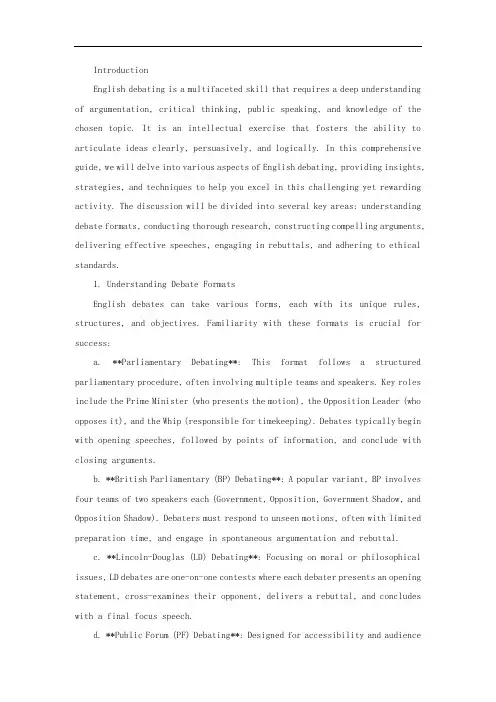
IntroductionEnglish debating is a multifaceted skill that requires a deep understanding of argumentation, critical thinking, public speaking, and knowledge of the chosen topic. It is an intellectual exercise that fosters the ability to articulate ideas clearly, persuasively, and logically. In this comprehensive guide, we will delve into various aspects of English debating, providing insights, strategies, and techniques to help you excel in this challenging yet rewarding activity. The discussion will be divided into several key areas: understanding debate formats, conducting thorough research, constructing compelling arguments, delivering effective speeches, engaging in rebuttals, and adhering to ethical standards.1. Understanding Debate FormatsEnglish debates can take various forms, each with its unique rules, structures, and objectives. Familiarity with these formats is crucial for success:a. **Parliamentary Debating**: This format follows a structured parliamentary procedure, often involving multiple teams and speakers. Key roles include the Prime Minister (who presents the motion), the Opposition Leader (who opposes it), and the Whip (responsible for timekeeping). Debates typically begin with opening speeches, followed by points of information, and conclude with closing arguments.b. **British Parliamentary (BP) Debating**: A popular variant, BP involves four teams of two speakers each (Government, Opposition, Government Shadow, and Opposition Shadow). Debaters must respond to unseen motions, often with limited preparation time, and engage in spontaneous argumentation and rebuttal.c. **Lincoln-Douglas (LD) Debating**: Focusing on moral or philosophical issues, LD debates are one-on-one contests where each debater presents an opening statement, cross-examines their opponent, delivers a rebuttal, and concludes with a final focus speech.d. **Public Forum (PF) Debating**: Designed for accessibility and audienceengagement, PF debates involve teams of two presenting arguments on current events or policy issues. Debaters give constructive speeches, cross-examine opponents, and deliver rebuttals and summaries.Understanding the specific requirements, timing constraints, and strategic nuances of your chosen format is essential for crafting a winning strategy.2. Conducting Thorough ResearchA strong foundation of knowledge is vital in English debating. To build this foundation:a. **Identify Key Sources**: Utilize academic journals, reputable news outlets, government reports, and expert opinions to gather accurate, up-to-date information on your topic. Be wary of biases and ensure sources are credible.b. **Analyze Data**: Interpret statistical data, case studies, and empirical evidence to support your arguments. Learn to recognize patterns, trends, and correlations that bolster your position.c. **Anticipate Counterarguments**: Study opposing viewpoints and anticipate potential objections to your arguments. Develop counterpoints or concessions that address these challenges effectively.d. **Organize Information**: Create a clear outline or mind map to organize your research, grouping relevant facts, examples, and quotes under each of your main arguments. This will facilitate efficient retrieval during the debate.3. Constructing Compelling ArgumentsCrafting persuasive arguments is at the heart of successful debating. Follow these guidelines:a. **Develop a Clear Thesis**: Your thesis should encapsulate your stance on the debate topic in a concise, assertive statement. It should be specific, defensible, and directly responsive to the motion.b. **Employ Logical Structure**: Present your arguments in a logical sequence, typically starting with your strongest point and progressing to weaker ones. Each argument should have a clear premise, evidence, and conclusion.c. **Utilize Rhetorical Devices**: Employ rhetorical techniques likeanalogies, anecdotes, rhetorical questions, and appeals to emotion to enhance the impact of your arguments. However, ensure these devices do not undermine the logical integrity of your case.d. **Address Counterarguments**: Anticipate and refute opposing viewpoints proactively, demonstrating that you have considered alternative perspectives and found them insufficient or flawed.e. **Provide Concrete Solutions**: Where applicable, offer feasible solutions or policy recommendations that align with your thesis, further solidifying your position.4. Delivering Effective SpeechesMastering the art of public speaking is crucial for conveying your arguments persuasively:a. **Engage Your Audience**: Establish eye contact, use expressive gestures, vary your tone and pace, and employ humor when appropriate to captivate your listeners.b. **Adhere to Time Limits**: Respect the allotted speaking time and structure your speech accordingly. Practice time management during preparation to ensure you cover all key points within the given timeframe.c. **Speak Clearly and Concisely**: Use simple, precise language and avoid jargon or overly complex sentences. Pause for emphasis and clarity, and enunciate words distinctly.d. **Use Visual Aids (if allowed)**: Where appropriate, utilize visual aids such as slides, graphs, or props to reinforce your arguments and maintain audience interest.5. Engaging in RebuttalsRebuttals provide opportunities to challenge your opponents' arguments and reinforce your own position:a. **Listen Carefully**: During your opponents' speeches, actively listen for weaknesses in their arguments, factual inaccuracies, or logical fallacies. Take notes to aid your rebuttal.b. **Focus on Key Points**: Address the most significant flaws or inconsistencies in your opponents' case, rather than nitpicking minor details. Be selective and strategic in your rebuttal.c. **Provide Evidence**: Support your反驳with concrete evidence, statistics, or expert opinions that contradict your opponents' claims. Demonstrate why your evidence is more reliable or relevant.d. **Redirect the Debate**: If possible, use your rebuttal to shift the debate in your favor by exposing the inadequacy of your opponents' arguments and reasserting the strength of your own position.6. Adhering to Ethical StandardsRespectful and fair conduct is essential for maintaining the integrity of the debate:a. **Treat Opponents with Courtesy**: Avoid personal attacks, insults, or derogatory language. Address your opponents respectfully, even in the face of disagreement.b. **Stick to the Topic**: Do not stray from the debate's central theme or introduce irrelevant information. Focus on addressing the motion directly.c. **Cite Sources Properly**: Give credit to authors, researchers, or organizations whose work you reference. Failure to do so constitutes plagiarism and undermines your credibility.d. **Accept Adjudicators' Decisions**: Respect the judgment of the adjudication panel, even if you disagree with their verdict. Use feedback constructively to improve future performances.ConclusionEnglish debating is a multifaceted skill that demands rigorous research, incisive argumentation, effective public speaking, and adherence to ethical standards. By mastering the various aspects discussed in this guide—understanding debate formats, conducting thorough research, constructing compelling arguments, delivering effective speeches, engaging in rebuttals, and adhering to ethical standards—you will be well-equipped to excel in thischallenging and intellectually stimulating activity. Remember, practice, patience, and a commitment to continuous improvement are key to refining your debating prowess and achieving success in this dynamic arena.。
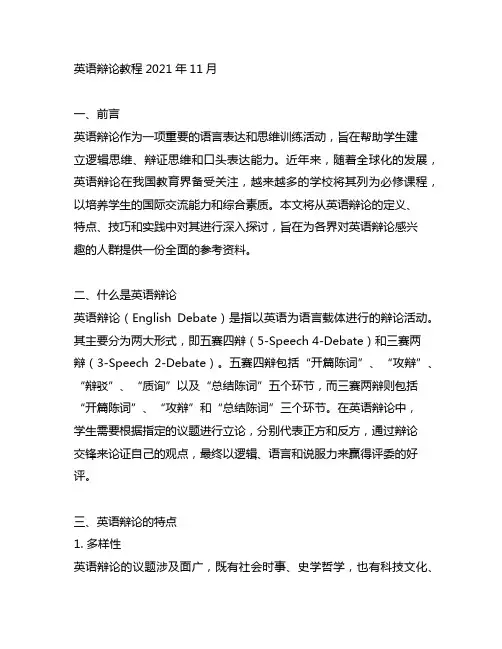
英语辩论教程2021年11月一、前言英语辩论作为一项重要的语言表达和思维训练活动,旨在帮助学生建立逻辑思维、辩证思维和口头表达能力。
近年来,随着全球化的发展,英语辩论在我国教育界备受关注,越来越多的学校将其列为必修课程,以培养学生的国际交流能力和综合素质。
本文将从英语辩论的定义、特点、技巧和实践中对其进行深入探讨,旨在为各界对英语辩论感兴趣的人群提供一份全面的参考资料。
二、什么是英语辩论英语辩论(English Debate)是指以英语为语言载体进行的辩论活动。
其主要分为两大形式,即五赛四辩(5-Speech 4-Debate)和三赛两辩(3-Speech 2-Debate)。
五赛四辩包括“开篇陈词”、“攻辩”、“辩驳”、“质询”以及“总结陈词”五个环节,而三赛两辩则包括“开篇陈词”、“攻辩”和“总结陈词”三个环节。
在英语辩论中,学生需要根据指定的议题进行立论,分别代表正方和反方,通过辩论交锋来论证自己的观点,最终以逻辑、语言和说服力来赢得评委的好评。
三、英语辩论的特点1. 多样性英语辩论的议题涉及面广,既有社会时事、史学哲学,也有科技文化、教育经济等各个领域。
这不仅为学生提供了更多的知识储备,也促进了他们的跨学科思维和综合素养。
2. 辩论性英语辩论是一种真正的交锋,不仅需要双方运用逻辑思维和论证技巧,还需要应变能力和口才表达。
在这个过程中,学生可以体验到争辩、质疑、辩驳等不同的语用方式,从而提升语言运用的丰富性和灵活性。
3. 国际性英语辩论的语言载体决定了其国际性。
如今,全球范围内的英语辩论比赛如雨后春笋般不断涌现,学生可以通过参与这些比赛,更好地与来自不同国家和地区的辩手交流,展现我国学生的风采。
四、英语辩论的技巧1. 查证能力英语辩论中,查证能力是十分重要的,因为一个议题的正确性和可信度往往取决于背后的事实和数据。
在准备辩论演讲时,学生需要通过书籍、期刊、新闻报道等多种途径获取信息,并能够对信息进行筛选和判断,以支持自己的观点。
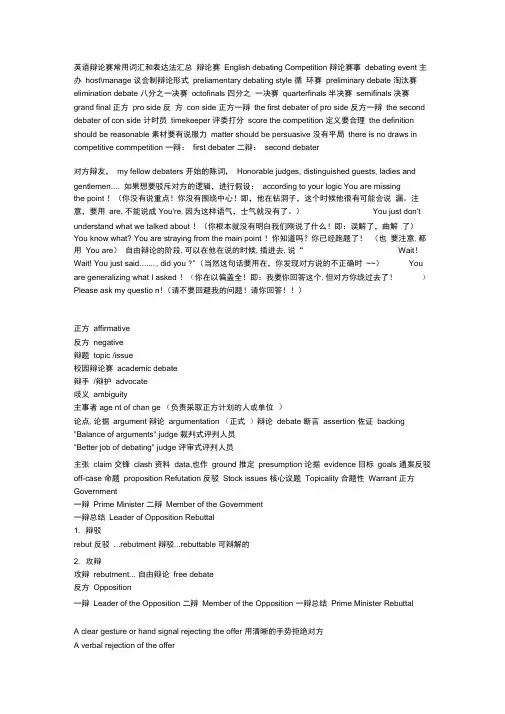
英语辩论赛常用词汇和表达法汇总辩论赛English debating Competition 辩论赛事debating event 主办host\manage 议会制辩论形式preliamentary debating style 循环赛preliminary debate 淘汰赛elimination debate 八分之一决赛octofinals 四分之一决赛quarterfinals 半决赛semifinals 决赛grand final 正方pro side 反方con side 正方一辩the first debater of pro side 反方一辩the second debater of con side 计时员timekeeper 评委打分score the competition 定义要合理the definition should be reasonable 素材要有说服力matter should be persuasive 没有平局there is no draws in competitive commpetition 一辩:first debater 二辩:second debater对方辩友,my fellow debaters 开始的陈词,Honorable judges, distinguished guests, ladies and gentlemen .... 如果想要驳斥对方的逻辑,进行假设:according to your logic You are missingthe point !(你没有说重点!你没有围绕中心!即,他在钻洞子,这个时候他很有可能会说漏。
注意,要用are,不能说成You're,因为这样语气,士气就没有了。
)You just don't understand what we talked about !(你根本就没有明白我们刚说了什么!即:误解了,曲解了)You know what? You are straying from the main point !你知道吗?你已经跑题了!(也要注意,都用You are)自由辩论的阶段,可以在他在说的时候,插进去,说“Wait!Wait! You just said ....... , did you ?"(当然这句话要用在,你发现对方说的不正确时~~)You are generalizing what I asked !(你在以偏盖全!即:我要你回答这个,但对方你绕过去了!)Please ask my questio n!(请不要回避我的问题!请你回答!!)正方affirmative反方negative辩题topic /issue校园辩论赛academic debate辩手/辩护advocate歧义ambiguity主事者age nt of chan ge (负责采取正方计划的人或单位)论点,论据argument 辩论argumentation (正式)辩论debate 断言assertion 佐证backing "Balance of arguments" judge 裁判式评判人员"Better job of debating" judge 评审式评判人员主张claim 交锋clash 资料data,也作ground 推定presumption 论据evidence 目标goals 通案反驳off-case 命题proposition Refutation 反驳Stock issues 核心议题Topicality 合题性Warrant 正方Government一辩Prime Minister 二辩Member of the Government一辩总结Leader of Opposition Rebuttal1. 辩驳rebut 反驳...rebutment 辩驳...rebuttable 可辩解的2. 攻辩攻辩rebutment... 自由辩论free debate反方Opposition一辩Leader of the Opposition 二辩Member of the Opposition 一辩总结Prime Minister RebuttalA clear gesture or hand signal rejecting the offer 用清晰的手势拒绝对方A verbal rejection of the offer语言拒绝A verbal acceptance of the offer 语言接受You are missing the point !(你没有说重点!你没有围绕中心!即,他在钻洞子,这个时候他很有可能会说漏。

(完整版)英语辩论赛常用词汇和表达法汇总英语辩论赛常用词汇和表达法汇总辩论赛English debating Competition辩论赛事debating event主办host\manage议会制辩论形式preliamentary debating style循环赛preliminary debate淘汰赛elimination debate八分之一决赛octofinals四分之一决赛quarterfinals半决赛semifinals决赛grand final正方pro side反方con side正方一辩the first debater of pro side反方一辩the second debater of con side计时员timekeeper评委打分score the competition定义要合理the definition should be reasonable素材要有说服力matter should be persuasive没有平局there is no draws in competitive commpetition一辩:first debater二辩:second debater对方辩友,my fellow debaters开始的陈词,Honorable judges, distinguished guests, ladies and gentlemen.....如果想要驳斥对方的逻辑,进行假设:according to your logicYou are missing the point!(你没有说重点!你没有围绕中心!即,他在钻洞子,这个时候他很有可能会说漏。
注意,要用are,不能说成You're,因为这样语气,士气就没有了。
)You just don't understand what we talked about!(你根本就没有明白我们刚说了什么!即:误解了,曲解了)You know what? You are straying from the main point!你知道吗?你已经跑题了!(也要注意,都用You are)自由辩论的阶段,可以在他在说的时候,插进去,说“Wait!Wait!You just said……,did you?”(当然这句话要用在,你发现对方说的不正确时~~)You are generalizing what I asked!(你在以偏盖全!即:我要你回答这个,但对方你绕过去了!)Please ask my question!(请不要回避我的问题!请你回答!!)英语辩论赛常用语A征求他人观点或意见的用语I would be glad to hear your opinion of …我很乐意听听你对……的意见。
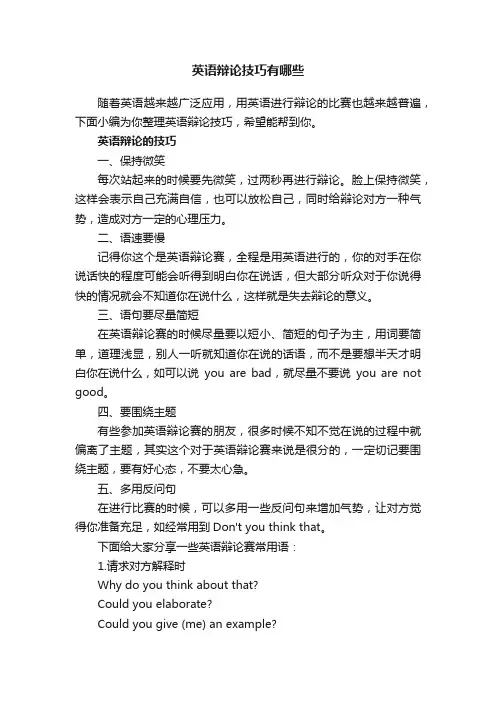
英语辩论技巧有哪些随着英语越来越广泛应用,用英语进行辩论的比赛也越来越普遍,下面小编为你整理英语辩论技巧,希望能帮到你。
英语辩论的技巧一、保持微笑每次站起来的时候要先微笑,过两秒再进行辩论。
脸上保持微笑,这样会表示自己充满自信,也可以放松自己,同时给辩论对方一种气势,造成对方一定的心理压力。
二、语速要慢记得你这个是英语辩论赛,全程是用英语进行的,你的对手在你说话快的程度可能会听得到明白你在说话,但大部分听众对于你说得快的情况就会不知道你在说什么,这样就是失去辩论的意义。
三、语句要尽量简短在英语辩论赛的时候尽量要以短小、简短的句子为主,用词要简单,道理浅显,别人一听就知道你在说的话语,而不是要想半天才明白你在说什么,如可以说you are bad,就尽量不要说you are not good。
四、要围绕主题有些参加英语辩论赛的朋友,很多时候不知不觉在说的过程中就偏离了主题,其实这个对于英语辩论赛来说是很分的,一定切记要围绕主题,要有好心态,不要太心急。
五、多用反问句在进行比赛的时候,可以多用一些反问句来增加气势,让对方觉得你准备充足,如经常用到Don't you think that。
下面给大家分享一些英语辩论赛常用语:1.请求对方解释时Why do you think about that?Could you elaborate?Could you give (me) an example?Can you illustrate that?What evidence do you have?2 表达自己看法时I think that . . .I don't think that .3.对自己的看法做出解释时Let me illustrate,For example,For instance,4.开始一个对话时To begin with,We need to discuss . . .determine…find outLet's start by (V ing)辩论赛中常用语句1.对方辩友是没有听见,还是没有听懂啊。
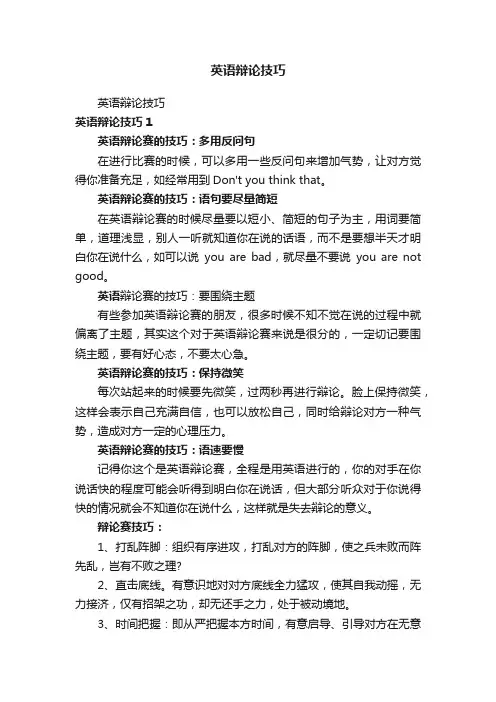
英语辩论技巧英语辩论技巧英语辩论技巧1英语辩论赛的技巧:多用反问句在进行比赛的时候,可以多用一些反问句来增加气势,让对方觉得你准备充足,如经常用到Don't you think that。
英语辩论赛的技巧:语句要尽量简短在英语辩论赛的时候尽量要以短小、简短的句子为主,用词要简单,道理浅显,别人一听就知道你在说的话语,而不是要想半天才明白你在说什么,如可以说you are bad,就尽量不要说you are not good。
英语辩论赛的技巧:要围绕主题有些参加英语辩论赛的朋友,很多时候不知不觉在说的过程中就偏离了主题,其实这个对于英语辩论赛来说是很分的,一定切记要围绕主题,要有好心态,不要太心急。
英语辩论赛的技巧:保持微笑每次站起来的时候要先微笑,过两秒再进行辩论。
脸上保持微笑,这样会表示自己充满自信,也可以放松自己,同时给辩论对方一种气势,造成对方一定的心理压力。
英语辩论赛的技巧:语速要慢记得你这个是英语辩论赛,全程是用英语进行的,你的对手在你说话快的程度可能会听得到明白你在说话,但大部分听众对于你说得快的情况就会不知道你在说什么,这样就是失去辩论的意义。
辩论赛技巧:1、打乱阵脚:组织有序进攻,打乱对方的阵脚,使之兵未败而阵先乱,岂有不败之理?2、直击底线。
有意识地对对方底线全力猛攻,使其自我动摇,无力接济,仅有招架之功,却无还手之力,处于被动境地。
3、时间把握:即从严把握本方时间,有意启导、引导对方在无意识中把规定时间及早耗尽,以造成缺席审判的情势,这对本方极为有利。
4、节奏把握:自由辩论的时间不长,但是由于争锋剧烈,对抗性强,故往往呈现出很强的快节奏。
一般而言,一强到底,一胜到底的队伍不多,这就需要有韧劲和力量持久才能取胜。
故有经验的辩论队往往是先弱后强,欲擒故纵。
其利在于先让对方强,以观察其底气,辨别其优劣,在制伏它。
5、避锋折锐:针锋相对,往往会陷于对峙和僵持。
你针尖我麦芒,你推我搡,既不利于取胜,现场效果也不好。
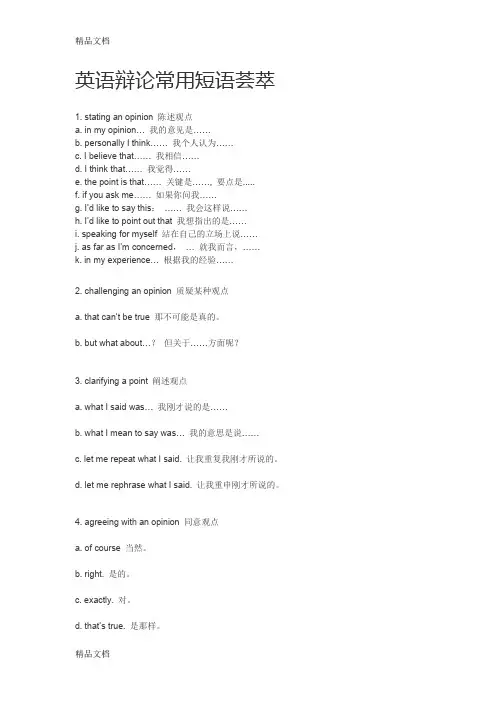
英语辩论常用短语荟萃1. stating an opinion 陈述观点a. in my opinion… 我的意见是……b. personally I think…… 我个人认为……c. I believe that…… 我相信……d. I think that…… 我觉得……e. the point is that…… 关键是……, 要点是.....f. if you ask me…… 如果你问我……g. I’d like to say this:…… 我会这样说……h. I’d like to point out that 我想指出的是……i. speaking for myself 站在自己的立场上说……j. as far as I’m concerned,… 就我而言,……k. in my experience… 根据我的经验……2. challenging an opinion 质疑某种观点a. that can’t be true 那不可能是真的。
b. but what about…?但关于……方面呢?3. clarifying a point 阐述观点a. what I said was… 我刚才说的是……b. what I mean to say was… 我的意思是说……c. let me repeat what I said. 让我重复我刚才所说的。
d. let me rephrase what I said. 让我重申刚才所说的。
4. agreeing with an opinion 同意观点a. of course 当然。
b. right. 是的。
c. exactly. 对。
d. that’s true. 是那样。
e. so do I. (neither do I.)我也这样认为。
(不这样认为。
)f. I agree completely. 我完全赞同。
g. I agree with you entirely. 我完全同意你所说的。
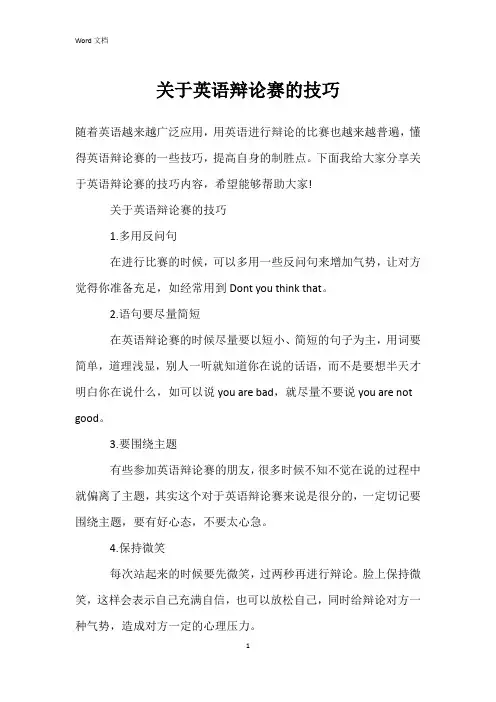
关于英语辩论赛的技巧随着英语越来越广泛应用,用英语进行辩论的比赛也越来越普遍,懂得英语辩论赛的一些技巧,提高自身的制胜点。
下面我给大家分享关于英语辩论赛的技巧内容,希望能够帮助大家!关于英语辩论赛的技巧1.多用反问句在进行比赛的时候,可以多用一些反问句来增加气势,让对方觉得你准备充足,如经常用到Dont you think that。
2.语句要尽量简短在英语辩论赛的时候尽量要以短小、简短的句子为主,用词要简单,道理浅显,别人一听就知道你在说的话语,而不是要想半天才明白你在说什么,如可以说you are bad,就尽量不要说you are not good。
3.要围绕主题有些参加英语辩论赛的朋友,很多时候不知不觉在说的过程中就偏离了主题,其实这个对于英语辩论赛来说是很分的,一定切记要围绕主题,要有好心态,不要太心急。
4.保持微笑每次站起来的时候要先微笑,过两秒再进行辩论。
脸上保持微笑,这样会表示自己充满自信,也可以放松自己,同时给辩论对方一种气势,造成对方一定的心理压力。
5.语速要慢记得你这个是英语辩论赛,全程是用英语进行的,你的对手在你说话快的程度可能会听得到明白你在说话,但大部分听众对于你说得快的情况就会不知道你在说什么,这样就是失去辩论的意义。
辩论战术1.划分战场基本的做法是把一系列关系紧密的问题作为一个战场,并由场上的一名队员提出其中的第一问题,其他队员立即跟上,直到问完这一系列问题,取得了满意战果后,转入下一战场。
这种战术的优点是:火力集中,进攻显得有章法,有层次。
缺点是:有时过于死板,为了贯彻连续提问,对对手临场暴露的弱点只能作简单攻击,而对对手的有力反驳又不能由最恰当的队员来防守,这和自由辩论随机应变的特点是相背离的。
结论:仍然可以适当决定几个战场,但不用强求连续提问,让队员自己控制提问的时机。
2. 两次发言在自由辨论中,一个队员发言后,不要立即把话筒传给其他队员,而在对方发言后,由其自己决定是否作第二次发言。
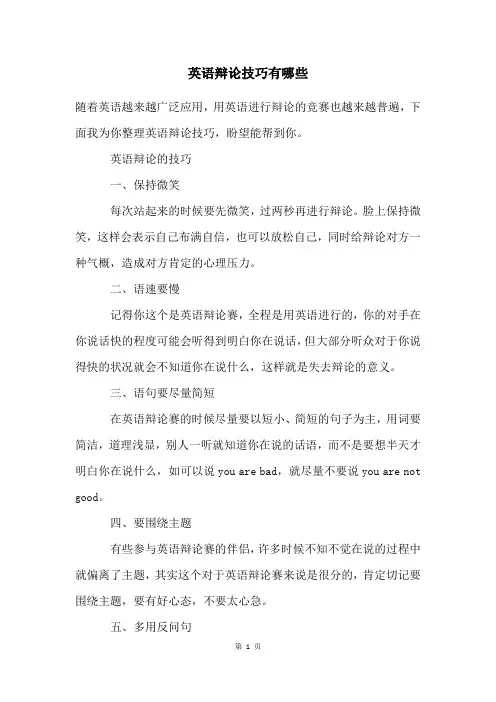
英语辩论技巧有哪些随着英语越来越广泛应用,用英语进行辩论的竞赛也越来越普遍,下面我为你整理英语辩论技巧,盼望能帮到你。
英语辩论的技巧一、保持微笑每次站起来的时候要先微笑,过两秒再进行辩论。
脸上保持微笑,这样会表示自己布满自信,也可以放松自己,同时给辩论对方一种气概,造成对方肯定的心理压力。
二、语速要慢记得你这个是英语辩论赛,全程是用英语进行的,你的对手在你说话快的程度可能会听得到明白你在说话,但大部分听众对于你说得快的状况就会不知道你在说什么,这样就是失去辩论的意义。
三、语句要尽量简短在英语辩论赛的时候尽量要以短小、简短的句子为主,用词要简洁,道理浅显,别人一听就知道你在说的话语,而不是要想半天才明白你在说什么,如可以说you are bad,就尽量不要说you are not good。
四、要围绕主题有些参与英语辩论赛的伴侣,许多时候不知不觉在说的过程中就偏离了主题,其实这个对于英语辩论赛来说是很分的,肯定切记要围绕主题,要有好心态,不要太心急。
五、多用反问句在进行竞赛的时候,可以多用一些反问句来增加气概,让对方觉得你预备充分,如常常用到Dont you think that。
下面给大家共享一些英语辩论赛常用语:1.恳求对方解释时Why do you think about that?Could you elaborate?Could you give (me) an example?Can you illustrate that?What evidence do you have?2 表达自己看法时I think that . . .I dont think that .3.对自己的看法做出解释时Let me illustrate,For example,For instance,4.开头一个对话时To begin with,We need to discuss . . .determinefind outLets start by (V ing)辩论赛中常用语句1.对方辩友是没有听见,还是没有听懂啊。
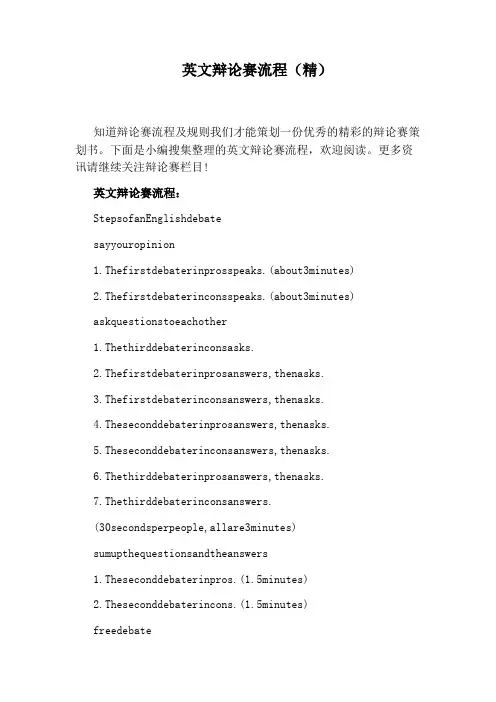
英文辩论赛流程(精)知道辩论赛流程及规则我们才能策划一份优秀的精彩的辩论赛策划书。
下面是小编搜集整理的英文辩论赛流程,欢迎阅读。
更多资讯请继续关注辩论赛栏目!英文辩论赛流程:StepsofanEnglishdebatesayyouropinion1.Thefirstdebaterinprosspeaks.(about3minutes)2.Thefirstdebaterinconsspeaks.(about3minutes)askquestionstoeachother1.Thethirddebaterinconsasks.2.Thefirstdebaterinprosanswers,thenasks.3.Thefirstdebaterinconsanswers,thenasks.4.Theseconddebaterinprosanswers,thenasks.5.Theseconddebaterinconsanswers,thenasks.6.Thethirddebaterinprosanswers,thenasks.7.Thethirddebaterinconsanswers.(30secondsperpeople,allare3minutes)sumupthequestionsandtheanswers1.Theseconddebaterinpros.(1.5minutes)2.Theseconddebaterincons.(1.5minutes)freedebateTheprosspeakfirst,thentheconsspeak.Prosandconstaketurnstospeak.(4minutesperpeople)sumsupallthearguments1.Thefourthdebaterinconsspeaks.2.Thefourthdebaterinprosspeaks.(4minutesperpeople)RulesTherulesofaskingpartThespeachofeachdebatershouldincludesanswerpartandaskpart.Theans wershouldbeclearandeasyandthequestionalsoshouldbeclear.(onlyonequest ioneachtime)Therulesoffreedebate1.Freedebateshouldbearoundtwoteams.Adebaterinprosspeaksfirstthen adebaterinconsspeaks.Twoteamstaketurns,untilthetimeisup.2.Thetimethateachteamtakesshouldbecalculatedthetotaltime.Whenone teamendthespeaking,webegintorecordthetimeoftheotherteam.3.Inthetotaltime.Itdoesn'tmatterthathowlongandhowmanytimesadebat erspeak.4.Ifoneoftheteamsusesoutthetime,theotherteamcangiveupspeakingork eepontakingturnsuntilthetimeisup.Givingupspeakingcannotinfluencethesc ore.Duringthedebate,debaterscannotreadtheimformationthatispreparedbef ore.Buttheycanshowthesummaryofanynewspaperorbook.Duringthedebate,debaterscannotleavesets.Theyalsocannotstopthespea kingoftheothersidedebaterortheirsidedebater.英文辩论赛流程介绍每组选手有2人组成,每场辩论正方称为“政府”,反方称为“野党”,每位辩手依次单独发言,对所给出的辨题进行辩论。
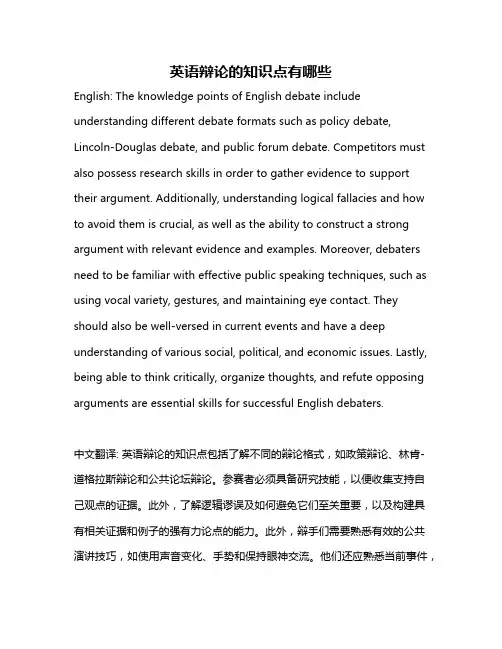
英语辩论的知识点有哪些English: The knowledge points of English debate include understanding different debate formats such as policy debate, Lincoln-Douglas debate, and public forum debate. Competitors must also possess research skills in order to gather evidence to support their argument. Additionally, understanding logical fallacies and how to avoid them is crucial, as well as the ability to construct a strong argument with relevant evidence and examples. Moreover, debaters need to be familiar with effective public speaking techniques, such as using vocal variety, gestures, and maintaining eye contact. They should also be well-versed in current events and have a deep understanding of various social, political, and economic issues. Lastly, being able to think critically, organize thoughts, and refute opposing arguments are essential skills for successful English debaters.中文翻译: 英语辩论的知识点包括了解不同的辩论格式,如政策辩论、林肯-道格拉斯辩论和公共论坛辩论。
English Debate
The content on this page is from the Internet.
Advice on Debating with Others
1. Avoid the use of Never. 2. Avoid the use of Always. 3. Refrain from saying you are wrong. 4. You can say your idea is mistaken. 5. Don't disagree with obvious truths. 6. Attack the idea not the person. 7. Use many rather than most. 8. Avoid exaggeration. 9. Use some rather than many. 10.The use of often allows for exceptions. 11.The use of generally allows for exceptions.
12.Quote sources and numbers. 13.If it is just an opinion, admit it. 14.Do not present opinion as facts. 15.Smile when disagreeing. 16.Stress the positive. 17.You do not need to win every battle to win the war. 18.Concede minor or trivial points. 19.Avoid bickering, quarreling, and wrangling. 20.Watch your tone of voice. 21.Don't win a debate and lose a friend. 22.Keep your perspective - You're just debating.
You need to be very polite when disagreeing with someone in English, even someone you know quite well. With someone you know very well, you can disagree more directly.
Argument Agreement and Disagreement
A. How to Agree Strongly with an Opinion. 1. I couldn't agree more! B. How to Half Agree with an Opinion. 1. Yes, perhaps, however ... 2. Well, yes, but ... 2. That's absolutely true! 3 .Absolutely! 4. I agree with your point. 5. I'd go along with you there. 6. I'm with you on that. 7. That's just what I was thinking. 8. That's exactly what I think. 9. That's a good point. 10. That's just how I see it. 11. That's exactly my opinion. 3. Yes, in a way, however ... 4. Hmm, possibly, but ... 5. Yes, I agree up to a point, however ... 6. Well, you have a point there, but ... 7. There's something there, I suppose, however. 8. I guess you could be right, but ... 9. Yes, I suppose so, however ... 10. That's worth thinking about, but ...
C. How to Disagree Politely with an Opinion. 1. I am not so sure. 2. Do you think so? 3. Well, it depends. 4. I'm not so certain. 5. Well, I don't know. 6. Well, I'm not so sure about that. 7. Hmm, I'm not sure you're right. 8. I'm inclined to disagree with that. 9. No, I don't think so. D. How to Disagree Strongly with an Opinion. 1. I disagree. 2. I disagree with your idea. 3. I'm afraid I don't agree. 4. I'm afraid your idea is wrong. 5. I can't agree with you. 6. I couldn't accept that for a minute. 7. You can't actually mean that. 8. I wouldn't go along with you there. 9. You can't be serious about that. 10. You must be joking. 11. It's possible you are mistaken about that.
You need to be very polite when disagreeing with someone in English, even someone you know quite well. With someone you know very well, you can disagree more directly.
Some Debate Series Argument Suggestions.
1. Television Plays a Positive Role in Society. 2. Students should have a Part-time Job. 3. The Younger Generation Knows Best. 4. Smoking Should Prohibited. 5. Money is the Most Important Thing in Life. 6. Women Should be Treated the Same as Men. 7. It is a Good Thing to Live in a Modern City. 8. Housing Reform has become necessary. 9. Cars do more Harm than Good. 10. Fashion Contributes to Society.
1. Television Plays a Positive Role in Society. Arguments in Favor: 1. Television is now playing a very important role in our lives. 2. Television is not only a convenient source of entertainment, but also a comparative cheap one. 3. Television keeps you informed about current events. It allows you to follow the latest developments in science and politics. It offers an endless series of programs that are both instructive and entertaining. 4. Many television programs introduce people to things they never thought of before and have never heard of before. 5. Television series have done a great job in popularizing many literary masterpieces. 6. Television has been good company to those who do not work, like housewives, lonely old people, etc. 7. With television people are still free to enjoy other "civilized pleasures", or even more. 8. There are a considerable variety of programs on television. The viewer is always free to choose whatever he wants to see. 9. Television provides enormous possibilities for education, like school programs via closed-circuit television. 10. Television provides special broadcasts for those in a TV University, or Open University.